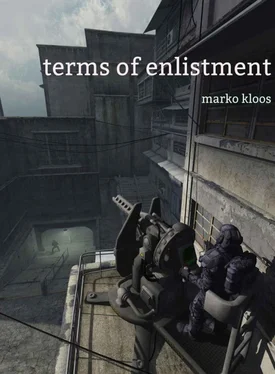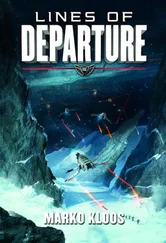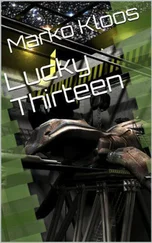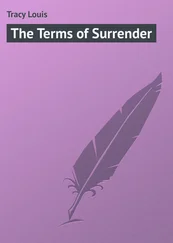Apparently, I’m not a great drop ship pilot. I’m not even a good one. After Day Two, I’d settle for being mediocre, but so far, I only manage to be abysmally bad. Somehow, my spatial sense gets all messed up by the unfamiliar sense of weightlessness, and my brain refuses to synchronize my control input on all three axis properly. The exercises consist of following a flight path to a drop zone, and the helmet-mounted tactical display helpfully shows the right vectors and navigation cues directly in my field of vision as I release from the simulated attack carrier and tumble towards the atmosphere of the planet below.
Without the automatic landing feature, I can barely get my ship pointed the right way. The throttle accelerates the craft, but it keeps moving according to the laws of physics, which means that tilting the nose merely moves it away from the axis of travel, rather than changing direction. Before too long, I end up flying sideways or backwards, and I can’t figure out how to coordinate my controls to make the nose point forward again. Flying a drop ship requires constant adjustments in all dimensions, like trying to run while keeping a ball bearing centered on a dinner plate you balance on your fingertips. It’s a skill that’s beyond my mental abilities, and by the end of Day Three, I have burned up in the atmosphere on every one of my drops.
“Recruit Grayson has destroyed a total of nine hundred million Commonwealth dollars so far,” Sergeant Burke says at the end of our third day, when he gives us his customary end-of-exercise critique. I feel my cheeks flush as some of the recruits laugh at his remark.
“Don’t feel bad, Grayson,” he tells me when he notices my embarrassment. “The rest of the platoon didn’t fare much better. We don’t expect anyone to actually land the ship, you know. We’re just trying to figure out which of you even have the talent to begin proper flight training.”
I don’t have to wonder about that, at least.
“How did you do?” I ask Halley when we sit on my bunk after the evening shower. We get a little time to sit and check our PDPs before the lights are turned off, and Halley and I usually stick our heads together to vent to each other.
“I landed the ship twice,” she says in a low voice, and flashes a proud grin.
“No shit? Did Burke say anything?”
“He said I seem to have a hand for it.”
“Looks that way,” I say. “All I’ve done all day was to turn my drop ship into a comet.”
“I’m just glad I’m good at something .”
It occurs to me that our disparate talents mean we’ll probably get posted to different services if we make it through Basic Training, and the idea of parting with Halley suddenly makes me depressed. I know it’s irrational—there are so many different Marine regiments and Navy fleet units that we would almost certainly not be serving together even if we ended up in the same service branch—but I can’t turn off the feeling. For a moment, I consider aligning my results with hers, slacking off on the infantry training to not get ahead of Halley in that respect, but there’s no way I could match her skill in the simulator, and I’m not even considering asking her to throw her results for my sake. Besides, the military being what it is, there’s little method in the assignments anyway, and we may yet end up serving in proximity to each other.
Halley recalls her first successful simulated landing, and I listen to the story and watch the little dimples she gets on her cheeks when she smiles.
The last few weeks of Basic Training are a blur of PT, classroom instruction, simulator sessions, meals, and private little get-togethers with Halley, carved out of our unceasingly busy schedules while dodging the near-constant supervision. At night, the instructor on duty sleeps in the Senior Drill Instructor’s office, and by now we have learned which of our sergeants are light sleepers. Sergeant Riley practically sleeps with one eye open, Sergeant Burke stays up until the early hours doing paperwork and listening to the feed from the platoon bay’s audio monitoring system, but Sergeant Harris is usually fast asleep from lights-out to reveille. That means every third night is what we’ve come to call ’date night’, where Halley and I sneak off to the head in the middle of the night to get a little bit of time together, away from the eyes and ears of our fellow recruits.
Our arrangement is not exactly a secret. It only took so many people walking in on us in the head at two in the morning to make it common knowledge, and I suspect that word has gotten around to the instructors as well. For some reason, however, there are no enforcement measures to keep us from sneaking off to the head together two or three times a week, and the other recruits have entered into a sort of unwritten understanding with us. There aren’t many of us left. Our platoon has shrunk to twelve members just before graduation week. Our chow hall table is still well-represented, since we lost only Cunningham. Everyone else has made it through: me, Halley, Hamilton, Garcia, and even Ricci. Hamilton is still platoon leader, and she will be carrying the guidon of the severely reduced Platoon 1066 at graduation.
When we march to our last communal dinner in the chow hall on the evening before graduation, we are every inch the last-weekers: fit and trim, with mirror-polished boots, marching in a precise cadence and at brisk speed. We march past newly arrived platoons, herds of bewildered-looking , long-haired kids in civilian garb, and they look at us just like we gazed at the last-weeker platoons almost three months ago.
On our last night, the sergeant on duty is Riley. Halley and I are already getting over the disappointment that we won’t get to fool around in the head one last time when Sergeant Riley takes her PDP out of the Senior Drill Instructor’s office, and turns off the light.
“This is your last night,” she tells the assembled platoon, as we wait in front of our lockers for the order to hit the rack.
“You’ve made it this far. I trust none of you will be knuckle-headed enough to pull any stupid shit that’ll get you kicked out just before graduation,” she says, and gives us a little smile. It’s more of a smirk, but it’s the first time we’ve ever seen anything but her perpetual stern expression on her face.
“Have a bit of a party, if you want,” Sergeant Riley tells us as we look at each other in disbelief. “Just keep it down, and make sure you’re where you’re supposed to be when reveille comes around.”
She turns around, tucks her PDP into the side pocket of her trousers, and walks out of the room.
“Good night, platoon.”
We grin at each other as she closes the hatch behind her.
“Well, how about that,” Hamilton says with a chuckle. “I’d say let’s break out the good stuff.”
We’ve all brought back food from the chow hall before, despite the admonitions of our drill instructors. All the PT and quarterdecking has turned us lean and perpetually hungry, and the meal times are simply spaced too far apart to keep our metabolisms going. Every time the chow hall serves a dessert that’s easily portable, many recruits end up taking seconds, wrapping the contraband donuts or brownies into napkins, and tucking them into trouser pockets. The instructors aren’t stupid, of course, but they turn a blind eye.
We pool our hidden food reserves on one of the empty bunks. They amount to a decent sampler of all the desserts served in the chow hall in the last week. We have a good variety of donuts and cookies, lots of fresh fruit, brownies, and even a few slightly smashed pieces of apple pie. There are no drinks, of course, but the water from the fountain in the head is cold and clean, and we’re so elated about this unsupervised night and our impending graduation that it might as well be cold beer.
Читать дальше












